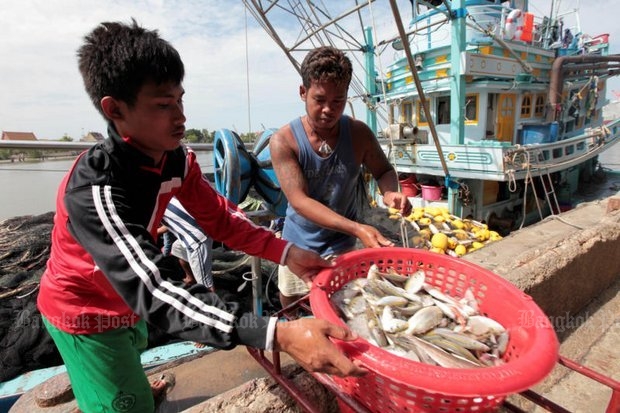
Myanmar worker Min-Min (not his real name) found himself on a Thai fishing boat off Indonesia in 2004. Forced to work at sea for years against his will, he said deaths were common and ill-health routine.
He witnessed two of his co-workers die on board the commercial trawler, and when the boat was docked he heard stories on piers of how another nine bodies had been found on other vessels and countless more thrown into the sea.
Common ailments suffered by those who spend extended periods at sea include weakness in the limbs, breathing difficulties, swollen bodies and impaired sensory perception. Doctors often diagnose these problems as symptoms of a disease called beriberi, caused by a vitamin B1 deficiency.
However, it is virtually impossible for most fishing workers to undergo health checks as they spend several months at sea each time. This in turn makes it difficult for Thai authorities to check worker conditions and health levels.
But last week's report of six deaths -- five Cambodians and a Thai -- and 20 sick workers on a Thai fishing vessel returning from a nine-month journey on the Indian Ocean has drawn attention to the industry. Public Health authorities announced the deaths were caused by a severe vitamin B1 deficiency.
Scurvy was cured in the 18th century by the discovery that it was caused by a lack of Vitamin C, with the remedy that ships at sea began carrying citrus supplies for the crew.
The incident also brought back memories of the notorious case of the Prapas Navi company, which kept its six vessels in Indonesian waters for four months after its concession expired, resulting in 39 deaths from starvation.
Min-Min, 33, had also experienced terrible ill-health at sea, says he knows crew members who suffer kidney failure caused by years of drinking poor-quality water distilled from seawater.
"It was common for workers to work long hours or sometimes even go days without proper meals," said Min-Min who managed to leave the job in 2007. He said his meals, which didn't come regularly, comprised of fish and a small portion of rice; vegetables and grains were rare.
Most workers, including him, knew the cause of their sickness was malnutrition and fatigue, but they could do nothing about it as some of them carried fake papers while others were undocumented. Min-Min, who used to carry a fake Thai ID card, suspected several migrant workers were victims of human trafficking.
He said he had knowledge about health and nutrition, but the brutal working schedules and conditions rendered this irrelevant. And the bosses' guns were all the incentive needed to keep working.
When Min-Min moved to another fishing vessel in 2012, this time willingly, he ended up in a similar plight. He also lost four fingers in an accident.
Even so, Min-Min considers himself one of the lucky ones, having survived where many others have perished.
"Those in authority won't go into the vessels to offer help," said Sak (not his real name), a former Thai fishing worker. "They know it's brutal. They know death is there."
He talked of poor working conditions on board, such as two to three hours spent sorting fish in refrigerated storage rooms at minus 30-degrees Celsius.
Leaving the vessel was never possible as it was always stationed in the middle of the sea, he said. Harvests were loaded and transported to land by another ship.
"There's no other choice for workers once they stepped into the vessels," Mr Sak said.
Patima Tungpuchyakul, a representative of the Labour Rights Promotion Network Foundation based in Samut Sakhon, said the living conditions and working schedules of fishing workers have never been taken into account.
The government is now tackling human trafficking after the country was downgraded in last year's Trafficking in Persons report. In the report, published by the United States, Thailand dropped to tier 3 -- the worst ranking.
Around the same time, the European Union slapped a yellow card on the country for its failure to cope with Illegal, Unreported and Unregulated (IUU) fishing.
The Fishery Act 2015, which came into effect in December, requires all Thai fishing vessels operating in foreign waters to carry an observer -- however, this is primarily to record details of catches, not workers' conditions.
"None of those [regulations] mentioned working conditions despite the high-risk nature of the job," said Patima Tungpuchyakul from the Labour Rights Promotion Network Foundation based in Samut Sakhon.
She said labour rights must be protected and occupational health risks recognised, with insurance coverage and fair compensation offered, even if the workers are illegal.
Migrant workers are currently working to set up a union in Samut Sakhon, Ms Patima said. "Migrant workers should have a voice. Most of their brutal stories have remained untold," she said.